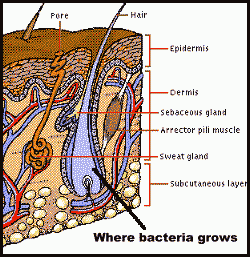|
Acne is a skin disorder that causes redness and swelling around the skin's oil-producing glands and hair follicles. Usually these glands make a substance called sebum that lubricates and softens the skin, but when this stuff gets trapped inside a blocked gland or follicle, it forms either a white plug (whitehead) or a dark plug (blackhead), where bacteria can grow. When bacteria grow in whiteheads and blackheads, they infect the skin, causing pimples, or "zits."  About 80% of teenagers have acne at some time during high school, because of higher hormone activity during those growth years. About 80% of teenagers have acne at some time during high school, because of higher hormone activity during those growth years. There is yet no scientific proof that diet can improve or worsen acne, although many people believe that it does. Lack of stress seems to make acne less noticeable, so clearer skin usually occurs during summer vacations. Acne can also be triggered by certain medicines. When acne is very noticeable on your forehead, it is often worsened by the use of oily or greasy hair products. Treating acne begins with good skin care ... cleaning the skin twice a day with unscented soap, and avoiding cosmetics and hair care products that are greasy and oily. Hair should be washed every day, and trimmed or combed so that it doesn't lay against the face. Girls who wear makeup should use a water-based formula, and should wash off all makeup before going to bed at night. Your doctor can recommend a good skin cleanser, as well as a non-prescription lotion or cream that can help remove sebum from the skin surface. When these treatments are not enough, your doctor may be able to prescribe medication that work well. Remember, popping a pimple is always a bad idea. Popping can spread infection and usually leaves scars. See your doctor if you have a severe case of acne that can't be controlled by the usual nonprescription acne remedies,or your acne begins to form deep lumps under the skin, leaves deep or overgrown scars, or involves large areas of their upper body or trunk. |